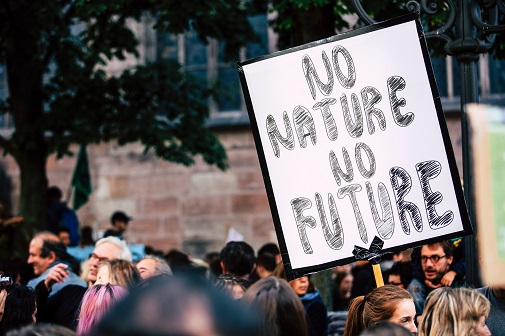Biodiversity: “Continue to mobilise, turn intentions into actions”
Didier Babin is Team Leader of the Post-2020 Biodiversity Framework – EU Support, funded by the European Union and implemented by Expertise France. Pauline Teillac-Deschamps is coordinator of BIODEV2030, a project financed by Agence Française de Développement (AFD), coordinated by Expertise France and jointly implemented by Expertise France, the International Union for Conservation of (IUCN) and WWF France.
Why a summit on biodiversity?
Pauline Teillac-Deschamps – Environmental issues have become political subjects that are directly addressed by Heads of State. This is the case for global warming, particularly since COP21 in Paris in 2015. It has taken a long time for biodiversity to become a high-level issue. It was therefore necessary to enhance mobilisation on this issue, especially as COP15 was initially supposed to take place in October 2020: the UN summit provided the opportunity to prefigure ambitious commitments for the Post-2020 Global Biodiversity Framework. Because urgent action is needed.
 When we destroy nature, we endanger society itself
When we destroy nature, we endanger society itself
Didier Babin – Indeed, this mobilisation is especially important because 2020 marks the end of the United Nations Global Decade on Biodiversity, which had a main objective: halt the erosion of biological diversity. The assessment of this decade is that it has ended in failure: hardly any of the Aichi targets defined in 2010 will be reached due to the lack of strong political will. This observation is shared by the UN and scientists, but also by NGOs and the private sector. Yet it will be impossible to achieve the Sustainable Development Goals without paying attention to the planet: almost half of world GDP comes from nature! So, when we destroy it, we endanger society itself. The Covid-19 crisis has strengthened this awareness of our interdependence with the living world.

In 2020, the IUCN has added 32,441 plant and animal species – including certain cockatoo species – to its Red List of Threatened Species.
What were the highlights of this summit and, more generally, of the “Campaign for Nature” organised before it?
Didier Babin – One of the highlights was the signing of a commitment for nature, the Leaders’ Pledge For Nature, by over 70 Heads of State two days before the summit. This commitment is more than just a declaration of intent, as a text listing 10 urgent actions to reverse biodiversity loss by 2030 was signed. There are also commitments by other types of stakeholder, such as young people and the financial sector, but also NGOs and civil society organisations through the Call to Action of the Post-2020 Pavilion Partnership linking the issues of equity, carbon neutrality and positive action for nature. Because beyond high-level political support, it is essential for all spheres of society to get involved.
 It is essential for all spheres of society to get involved
It is essential for all spheres of society to get involved
Pauline Teillac-Deschamps – Despite the restrictions related to Covid-19, many stakeholders concerned by biodiversity have continued with initiatives and the mobilisation to contribute to creating a global movement, which in turn make governments feel legitimate and commit to this subject. Indeed, two key approaches were highlighted at the United Nations summit for biodiversity:
• Firstly, mainstreaming, which corresponds to the willingness to take into account the issues of biodiversity protection and sustainable natural resources management at all levels of society and in particular in the economy;
• Secondly, the fact that all segments of society (policy makers, NGOs, companies, financial sectors, young people, indigenous peoples, etc.) have taken up this issue and are working to make their contributions to the construction of the Post-2020 Global Biodiversity Framework.
What are the challenges until the COP15 on biodiversity?
Pauline Teillac-Deschamps – One of the challenges will be to scale up this “momentum” until the COP15 next year. We need to increase the mobilisation and especially turn intentions into actions and combine all this with the means of implementation.
 One of the challenges will be to scale up this ‘momentum’ until the COP15
One of the challenges will be to scale up this ‘momentum’ until the COP15
This will be a real challenge, especially because it is difficult to hold formal or informal face-to-face meetings between the negotiators of a new biodiversity agreement due to the health constraints. There is also a risk of the argument of post-Covid economic recovery being used to postpone decision-making concerning biodiversity and, more generally, the environment. It is a simplistic short-term vision that would drive us straight into a wall, as biodiversity and the economy are inseparable today. The draft agreement for the Post-2020 Global Biodiversity Framework needs to be more ambitious, especially over the essential contribution of economic sectors to bring about transformational changes in our societies.
 It is very positive to see the business community actively mobilised
It is very positive to see the business community actively mobilised
Didier Babin – We need to take action as of now on everything that harms biodiversity and change our ways of doing things as producers and as consumers. In this respect, it is very positive to see the business community actively mobilised. Banks and the financial sector in general also have a key role to play, to stop investments that are harmful to biodiversity and also to complement the financing for biodiversity, which is mainly public at this stage.
How will the projects you manage get involved in this movement?
Pauline Teillac-Deschamps – In the context of BIODEV2030, we are working with IUCN and WWF and are entering a diagnostic phase which is helping sixteen pilot countries identify their vulnerability in terms of biodiversity, but also the opportunities they have. On this basis, the stakeholders concerned (public actors, private sector, civil society in the broad sense) will subsequently be able to collectively define national sectoral commitments in preparation for COP15, in key economic sectors – key for the country’s economy and key through their impact and dependence on natural resources. The voluntary sectoral commitments that will be discussed in each target country and the approach used to achieve them will be shared at international level to feed into the debate for the preparation of the Post-2020 Global Biodiversity Framework and its implementation.
 Promote biodiversity mainstreaming into development strategies
Promote biodiversity mainstreaming into development strategies
The entire approach aims to promote biodiversity mainstreaming into development strategies. It also involves making a connection with other major issues such as the climate and the Sustainable Development Goals. Let us not forget that the achievement of 14 of the 17 SDGs directly depends on the protection of biodiversity! A society that allows humanity to live in decent conditions is a society that uses natural resources sustainably, while sharing their benefits fairly.
Didier Babin – This is contributing to the development of a new narrative of an “equitable, carbon-neutral, nature-positive world”, which the Post-2020 Biodiversity Framework – EU Support project is contributing to defining. The objective of this project is to help prepare COP15 on biological diversity and its implementation, where the issue will be the adoption of a strategic plan for biodiversity for the post-2020 period.
 Help prepare COP15 and its implementation
Help prepare COP15 and its implementation
From now until COP15, we will be seeking to increase our support to the negotiation process, which must continue despite the health situation so that we can reach an ambitious and transformative agreement. At the same time, we will continue to produce concept papers. Finally, we will continue to support the mobilisation of various types of stakeholders, such as cities, non-governmental organisations, the business community and youth movements. They were all instrumental in the success of the Paris Agreement on Climate Change. Biodiversity needs everyone’s commitment!
 More about BIODEV2030
More about BIODEV2030
 More about the Post-2020 Biodiversity Framework - EU Support
More about the Post-2020 Biodiversity Framework - EU Support


